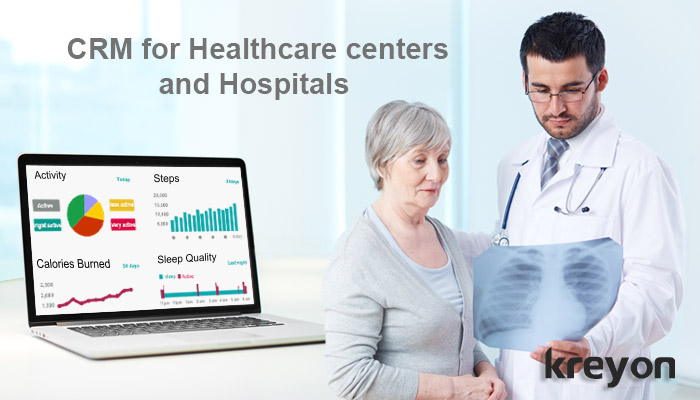CRM for Hospitals & Healthcare Centers

As per Gartner, the worldwide CRM market is expected to reach $36.5 billion. Most industries around the globe are already benefitting from CRM softwares. They are using CRM systems to power their sales, marketing operations and connect with their customers better. Harvard Business Review conducted a study and found, “Some companies can boost profits by almost 100% by retaining just 5% of their customers.” The hospitals & healthcare centers are also looking at avenues for improving clinical, financial and operational outcomes. Patient acquisition, retention and high quality service are top priorities for Hospitals and healthcare centers. A CRM system helps them to assess and improve upon these parameters. Here is a look at how the hospitals and healthcare centers are assisted by CRM systems:
1. Improved Patient care and engagement:
A CRM system keeps the track record of all patients in the system. The integrated records of all patients help the hospital to manage communications effectively. The notifications, alerts and reminders for patients are sent through these systems. Even after the patients are discharged, they continue to get the messages from the hospital. The patients are also notified for follow-ups and appointment alerts are sent to them. The medication reminders, reports, dos and don’ts are sent to patients on their mobile device. Healthcare software products can add a new lease to the way medical institutions operate.
2. Marketing & Sales Campaigns:
When it comes to acquiring patients, the hospitals need to do multi channel campaigns and manage them. It is however hard to analyse the effective ROI without an integrated system. The marketing and sales campaigns can be run from a CRM system. All online and offline campaigns can be tracked from this system. Hospitals are able to analyse the results of the campaigns for billboards, radio, newspapers, and social media etc with CRM systems more effectively. The marketing and sales campaigns can be planned and implemented to minimise expenses and maximise growth.
3. Referrals from other hospitals, physicians & others:
Hospitals get lot of patients from referrals from other health care centers, physicians and other consultants etc. CRM system helps them to keep track of all data related to individuals, referral status and other associated details. The referral incentives are also tracked in the system. The referral data and its parameters can be customised as per the needs of the healthcare establishments.
4. Patient retention and loyalty:
The indoor and outdoor patients are tracked using the integrated system. The system helps the hospitals to keep in touch with outgoing patients and provide them support during their rehabilitation. The feedback of patients for doctors, hospital and its facilities is managed with a CRM system. The hospital rating and feedback etc can be evaluated by the management. The feedbacks and ratings are automatically sent to the designated authorities. Use of technology is geared to increase patient loyalty and satisfaction.
5. Promotional Outreach Programs:
Healthcare centers generate enquiries from various mediums like walk-ins, conferences, web visitors, blogs, ads etc. CRM is used to manage all the data for these individuals or prospects. The healthcare centers can promote their wellness and healthcare products to these prospects using the CRM system. Programs for healthy diet charts, weight loss, skin care, body analysis, nutrition management etc. can be promoted through CRM systems. The pricing aspects for these health care products and services as well as the customer response can be managed through the centralised system.
6. Scheduling Appointments & calendars:
The consultations and appointments for doctors can be booked with the CRM. The availability of the doctors can be checked by visitors and then a request for appointment be initiated and confirmed through the online system. The appointments diary and calendars for doctors can be managed effectively with this system. The reminders and alerts ensure that patients/doctors are well informed leading to fewer appointment cancellations. The total work load of doctors, number of meetings and their availability can be managed conveniently.
7. Patient Diagnostics:
Data related to patient diagnostics, consultations, physician notes, prescriptions, medical reports, previous history of other ailments are stored centrally. All data and information about the patient is presented to the consulting physicians in an organised manner. The centralised access of data makes it easy for the doctors to share information across departments for consultations. The patient also has a privileged access to the system where he can see all the relevant details for his treatment.
8. Equipment & healthcare facilities:
Managing the infrastructure and equipments for healthcare institutions can be complex. The equipments, infrastructure and machines are very expensive. The utilisation of these equipments and facilities can also be measured with a CRM system. Every department can manage their own equipment and submit an online usage report for them. The utilisation of these equipments should be ideally over 80%. This data also serves useful purpose at the time of procurement of new equipments.
9. Multiple Locations:
Managing multi locations for a hospital chain can be an administrative nightmare. But a CRM system can ensure best practices and their implementation through the different locations. The multiple locations for a healthcare group can be managed through a centralised system creating consistent brand identity. The management can also compare the operational costs, ROI, maintenance & utilisation of equipments across various locations.
10. Realtime Interactions and Reputation Management:
Brands are increasingly using the digital medium to engage prospects, communicate with them to turn them into customers. And customers into their brand advocates. A CRM system can help the health care institutions to monitor the conversations about specific keywords, say liver transplant, eye surgery etc. on the social media. The social media conversations about their brands, specific keywords can be monitored through a realtime dashboard on the CRM. The hospitals are able to listen to these conversations and are able to interact with people through this integrated dashboard. The conversations from the most popular platforms like Twitter, Facebook, Youtube, Google, blogs etc can be integrated in this dashboard.

11. Improved Operations, communication & business processes:
A CRM system can track operations, communications and key business processes for a hospital. Some of the key aspects that can be managed using the system are as follows:
a) Hospital & facility management: The procurement, maintenance for equipments and other facilities can be automated. The invoices, purchase orders, quotations, costs and expenses for running operations can also be tracked using this centralised system.
b) Meetings: All the meetings can be created and notified through this tool. The recipients all get notifications, reminder alerts etc.
c) Contracts: The contracts with all associated equipment vendors, support staff and others can be maintained through this tool. When renewals are due, the designated people are notified through the system.
d) Staff: Tasks related to facilities and operations are assigned to staff members. The key administrative functions like billing, inventory management can be managed using this system.
e) Documents & Information: A centralised digital document system for all administrative, operational and patient related documents. Data can be accessed from anywhere anytime by doctors, administrative staff and the management.
CRM is one of the most potent tools powering businesses to greater heights and growth. The hospitals and healthcare centers are using these systems to reduce their operational expenses, wastage, increase patient retention, satisfaction, revenue & profitability. Kreyon provides CRM implementation services to healthcare institutions for managing resources efficiently, connecting with patients & serving them better. A CRM system helps healthcare institutions to measure performance for driving best organizational results.
